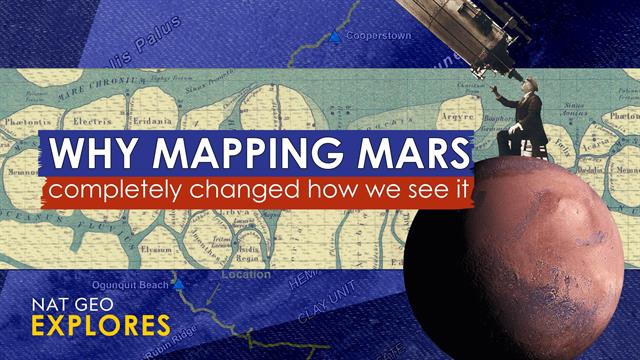The Rivalry That Fueled Our Mars Obsession

The Rivalry That Fueled Our Mars Obsession. Discover more detailed and exciting information on our website. Click the link below to start your adventure: Visit Best Website. Don't miss out!
Table of Contents
The Rivalry That Fueled Our Mars Obsession: A Space Race Revisited
The red planet has captivated humanity for centuries, inspiring myths, fueling scientific curiosity, and igniting a fierce competition that ultimately propelled us closer to understanding our celestial neighbor. While the quest for Mars is often framed as a purely scientific endeavor, the truth is far more compelling: it's a story deeply rooted in geopolitical rivalry and the relentless pursuit of national prestige. This article delves into the fascinating history of the Space Race and how the rivalry between the US and the Soviet Union became the unexpected catalyst for our ongoing Mars obsession.
The Cold War's Red Planet: A Proxy Battle in the Cosmos
The Space Race, a defining characteristic of the Cold War, wasn't just about launching satellites or putting a man on the Moon. It was a symbolic battleground, a demonstration of technological prowess and national strength. The Soviet Union's early victories – launching Sputnik in 1957 and sending Yuri Gagarin into orbit in 1961 – sent shockwaves through the United States, triggering a surge in funding and a national commitment to surpass their rival. This urgency extended beyond Earth's orbit; Mars became a crucial focal point in this cosmic competition.
From Sputnik to Mariner: Early Missions and the Seeds of Rivalry
The early robotic missions to Mars, while technologically less advanced than today's sophisticated rovers, were vital steps in this geopolitical chess match. Both superpowers poured immense resources into developing spacecraft capable of reaching the red planet, each launch representing a statement of intent and a measure of success. The Mariner program, a series of American probes, marked significant progress, while the Soviet Union's attempts, though less successful in terms of achieving orbit or landing, still demonstrated their ambition and commitment to the Martian race. These early setbacks, however, only intensified the rivalry, fueling further investment and technological innovation.
The Apollo Effect and the Shift in Focus
The Apollo 11 moon landing in 1969 undeniably shifted global attention. However, the success of the Apollo program didn’t diminish the Mars ambition. Instead, it provided invaluable experience, technology transfer, and, crucially, sustained public and political support for continued space exploration. The resources and expertise gained from the Moon landing became crucial building blocks in the development of more advanced Mars exploration technology.
Beyond the Cold War: A Legacy of Competition and Collaboration
While the Cold War's intense rivalry is no longer the primary driver, the legacy of that competition continues to shape our approach to Mars exploration. The spirit of pushing boundaries, exceeding expectations, and achieving the seemingly impossible – all hallmarks of the Space Race – remain powerful motivators. However, the modern space age is also characterized by increased international collaboration. Organizations like ESA (European Space Agency) and other international partners contribute significantly to current and future Mars missions, demonstrating a shift from purely nationalistic pursuits to a more collaborative global endeavor.
The Future of Mars Exploration: A New Race?
Today's Mars exploration is less about direct geopolitical competition and more about a global race to unravel the mysteries of the red planet. The search for past or present life, the potential for future human colonization, and the sheer scientific value of understanding Mars's history all contribute to a renewed sense of urgency and excitement. While the rivalry that propelled early missions is fading, the competitive spirit – the drive to discover, innovate, and achieve – remains a powerful force, ensuring that the fascination with Mars continues to burn bright.
Keywords: Mars, Space Race, Cold War, Soviet Union, United States, Mariner program, Apollo program, Mars exploration, space exploration, red planet, NASA, ESA, robotic missions, human colonization, extraterrestrial life.
Call to Action: Learn more about the latest Mars missions and how you can get involved in space exploration by visiting [link to relevant space agency or organization].

Thank you for visiting our website wich cover about The Rivalry That Fueled Our Mars Obsession. We hope the information provided has been useful to you. Feel free to contact us if you have any questions or need further assistance. See you next time and dont miss to bookmark.
Featured Posts
-
 Trump Claims Ev Mandate End Fact Checking His Statement
Jan 24, 2025
Trump Claims Ev Mandate End Fact Checking His Statement
Jan 24, 2025 -
 Sudden Death Of Netflix Personality Accident Investigation Underway
Jan 24, 2025
Sudden Death Of Netflix Personality Accident Investigation Underway
Jan 24, 2025 -
 Senator Rubios Trip Will Panama Be The First Destination
Jan 24, 2025
Senator Rubios Trip Will Panama Be The First Destination
Jan 24, 2025 -
 Samsung Unpacked 2025 Data Hora E Como Assistir Online
Jan 24, 2025
Samsung Unpacked 2025 Data Hora E Como Assistir Online
Jan 24, 2025 -
 Sindaco 38enne Stroncato Da Malore Le Cause Della Morte
Jan 24, 2025
Sindaco 38enne Stroncato Da Malore Le Cause Della Morte
Jan 24, 2025
